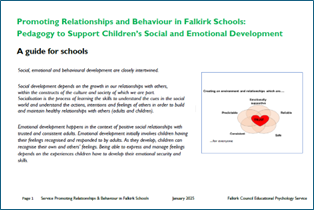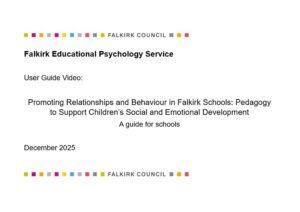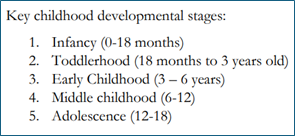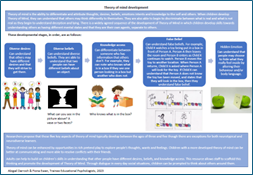Reading at home
Shared reading is a great way to develop children’s language and communication and to boost their reading skills. The Education Endowment Foundation have 7 top tips to support reading at home. This is also available in the following languages: Bengali, Lithuanian, Polish, Punjabi and Urdu. You can access the translations here.
Relationships and Behaviour
Behaviour in children is a product of their social and emotional development. Social development depends on the growth in our relationships with others. Emotional development happens in the context of positive social relationships with trusted and consistent adults. The evidence in school and early years education is that positive behaviour is best promoted through:
- A whole school approach using relationship based practice
- A partnership approach with parents
- All staff being clear and consistent in the use of these positive approaches and what to do when behaviour is less positive
Falkirk EPS has developed some key resources for school leaders and staff. The following guide is a key document to allow school practitioners to share, discuss and collaborate on the agreed approaches. This has been newly developed in 2025 as part of a three year strategic plan for Falkirk.

Promoting Relationships and Behaviour in Falkirk Schools (Jan 2025)

Promoting Relationships and Behaviour in Falkirk Schools Video Guide.
Additional resources that have been developed are provided below. Please also consider what training and development work would be helpful and have a look at CPD manager, our online training offers and our practitioners blog within the A-Z.
Resources to accompany the Understanding Behaviour in Context training
Understanding behaviour PDF handout
Social and Emotional Development in Childhood
 Guide to development through toddlerhood, early childhood, middle childhood, adolescence covering the domains of: emotional awareness, recognition & regulation; social skills; relationships, self-identity and self-esteem. Click on image to access and accompanying document.
Guide to development through toddlerhood, early childhood, middle childhood, adolescence covering the domains of: emotional awareness, recognition & regulation; social skills; relationships, self-identity and self-esteem. Click on image to access and accompanying document.
Theory of Mind
 Theory of mind is the ability to differentiate and attribute thoughts, desires, beliefs, emotions intents and knowledge to the self and others. When children develop Theory of Mind, they can understand that others may think differently to themselves. They are also able to begin to discriminate between what is real and what is not real as they begin to understand deception and lying. There is a widely agreed sequence of the development of Theory of Mind in which children develop skills towards understanding others as having different mental states and that they are their own agents, separate to others. Click on image to access.
Theory of mind is the ability to differentiate and attribute thoughts, desires, beliefs, emotions intents and knowledge to the self and others. When children develop Theory of Mind, they can understand that others may think differently to themselves. They are also able to begin to discriminate between what is real and what is not real as they begin to understand deception and lying. There is a widely agreed sequence of the development of Theory of Mind in which children develop skills towards understanding others as having different mental states and that they are their own agents, separate to others. Click on image to access.
Additional Resources
Relationships and Behaviour – Education Scotland
Education Scotland has produced a range of materials which are designed to provide research, guidance, support, professional learning, exemplification and advice to practitioners in education for improving relationships and behaviour within their context – Improving relationships and behaviour.
Resilience
The Journey: Adventures in Resilience a resource from Education Scotland written for 13-16year olds to be used by practitioners or parents/carers.
Resilience Alphabet (primary) (secondary resource pending)
Risk Assessment and Management
Falkirk Council and Forth Valley child protection policies, procedures & guidelines
The National Risk Framework to Support the Assessment of Children and Young People (Scottish Government, 2012) is a ‘toolkit’ for child protection to support practitioners in identifying and acting on child protection risks in children and young people.
Forth Valley Managing and Preventing Harmful Sexual Behaviour guidelines and resources
Falkirk Council Care and Risk Management (CARM) procedure recognises the link between young people’s offending/risk taking behaviour and unmet need. It applies to young people between 12-18 years within Falkirk Council who present a serious risk of harm to others as a result of sexual and/or violent behaviour.
The Framework for Risk Assessment, Management and Evaluation (FRAME) (2014) is for local authorities and partners working with children and young people who offend (managing high risk and transitions).
Falkirk Council risk assessment pro-formas
Scottish Government (2020). Harmful sexual behaviour by children and young people: Expert Group Report.
